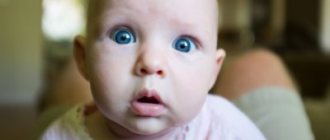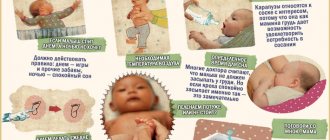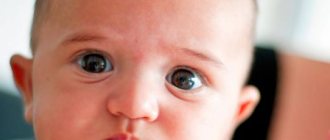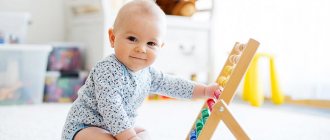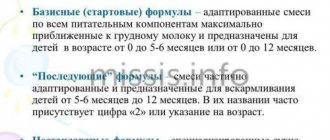Reasons for baby crying after bathing
The purpose of bathing a newborn baby is not only to cleanse his skin of all kinds of impurities, but also to calm him down and prepare him for sleep. However, sometimes this procedure has the opposite effect. Instead of relaxing and wanting to sleep, the child begins to cry a lot and it can be difficult even for the mother to calm him down.
Possible reasons why an infant cries after bathing:
- Sudden temperature changes. If the temperature in the room where the child is used to being is not too high (22-23°C), and the water in the bathroom significantly exceeds this figure. This may cause some discomfort and, as a result, the baby may cry.
- Incorrect water temperature. When preparing a bath for your baby, you should not rely on your feelings. The water temperature, normal for an adult, may be unacceptably hot or too cool for a sensitive baby.
- Hunger or desire to drink. At this stage of life, a small person is not able to communicate his desires in any way other than crying. During bathing, a large amount of energy is consumed, which can make the child hungry or thirsty, which parents will definitely recognize by the demanding cry.
- Fear of the unknown. For a newborn child, everything around him arouses interest, and sometimes even fear of the new and unknown. After finishing bathing, the baby may become frightened, for example, by the height to which he was raised to get him out of the bath.
- Excess of emotions. For an adult child, soap bubbles, colorful toys and splashes of water cause only joy and tenderness. For the fragile psyche of an infant, an excess of emotions, even positive ones, can cause stress. This is why children cry after bathing.
- Fatigue and desire to sleep. Water procedures can tire even an adult; a child, too, having relaxed in warm water, is ready for bed. When, instead of the expected rest, they begin to dry him and change his clothes, the baby may not like it.
- Pain syndrome. Bathing time usually occurs in the evening, during which time colic worsens. In older children, crying after bathing may be associated with teething pain.
- Duration of bathing. There is always the possibility that the child is not satisfied that he was bought too quickly or that the procedure was delayed.
- Time for water procedures. If the baby is hungry or wants to sleep during bathing, it is recommended to reschedule water procedures to an earlier or later time.
- Parents' anxiety. There is an invisible connection between a newborn baby and his parents, especially his mother. All young children are very sensitive to her mood. Therefore, when bathing your child, remain calm.
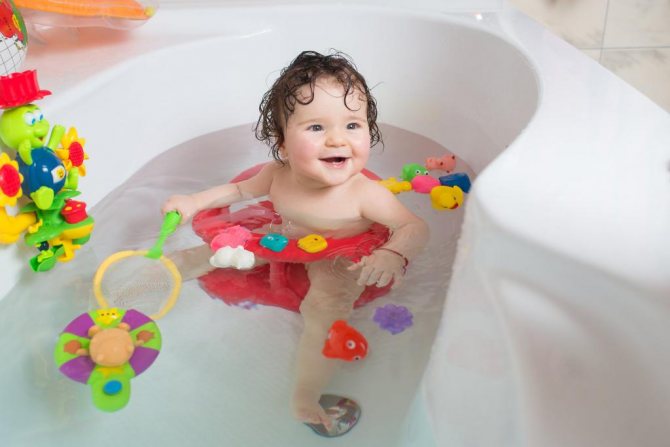
Why does a child cry after bathing?
Bathing a newborn is a whole science! The first “swim” should be approached with all responsibility, so as not to spoil the child’s impression of the procedure, which he will undergo every day for many months. Therefore, every parent should study in detail all the advice and recommendations that pediatricians and parents give on this matter.
If no mistakes were made, then the child will almost certainly love bathing: warm water relaxes, soothes, relieves tension, massages and trains muscles, it reminds him of the fertile prenatal period of his life, and as the child grows up, it also becomes an excellent environment for funny and fun games. Most children enjoy bathing and swimming in large bathtubs or simply splashing around in deep basins. But it very often happens that after bathing a child starts screaming! It’s impossible to dry the baby properly or calmly dress him: he’s just fighting!
First of all, we want to say that this happens very often! And many parents cannot do anything about it: a certain period of time passes until the child calms down on his own and stops the hysterics that suddenly started one day.
But it will be much better for both you and the baby if you manage to find the reason for the child’s crying in this case. And judging by the life experience of many parents, there may be several of them:
- COLD . After a warm steaming bath, the feeling of cold is especially unpleasant! Babies often cry after bathing due to the resulting temperature difference when they are taken from warm water or a bath warmed by steam and suddenly moved to a relatively cool room. If you bathe your baby in water at a temperature of 37°C, and the room is 18°C, then it is likely that he is crying for this very reason.
- HEAT . Too high a water temperature while swimming can also cause crying. Pediatricians do not recommend bathing your baby in very warm water; on the contrary: to harden the temperature of the water in the bath, you should gradually reduce it. At the very least, the child’s body should not turn red during and after bathing. If he gets too steamy, it will not only be harmful to his health, but will also worsen the child’s well-being, which will cause the baby to start crying. If the child cries after you have dressed him and started, say, feeding him after bathing, then it is also quite possible that he is hot due to excess or excessively warm clothes.
- HUNGER . It is known that water “pulls out” energy and greatly increases appetite. Many children, and adults too, become hungry after swimming in any body of water, and even in the bathroom. Hunger is a common cause of newborn crying at the end and after bathing. And you should not immediately discard this reason if you bathe your child after feeding (by the way, it is better not to do this directly after eating): after taking a bath, the baby may feel hungry, as if he had not eaten at all before.
- THIRST . The same goes for the feeling of thirst: you want to drink even after swimming in a cool river, let alone taking a warm bath, especially if the procedure lasted a long time and the child was actively swimming or playing. In addition, during bathing the body loses moisture, which must then be replenished.
- FATIGUE . It is absolutely possible, and even very likely, that the child is tired and overexcited. Some babies even fall asleep right in the water, but others start crying. The baby may not feel tired while bathing, but after the procedure is completed, he cries for this very reason: he wants to sleep. It’s impossible to either dress or feed her calmly.
- COLIC . It often happens that the evening bath procedure coincides with colic. Warm water relieves spasms and painful attacks, relaxes the muscles of the internal organs, and therefore pain in the tummy is not felt. As soon as the child is pulled out of the water, he immediately begins to twist, twist his legs and press them to his stomach. If you suspect colic, give your baby a massage right in the bathroom.
- FEAR . A small child can be afraid of anything. Even if, as it seems to you, nothing has changed in the bathing procedure, he could still be frightened by the sound of the water, a bizarre shadow, some new object in the bathroom, or even the very moment of getting him out of the water: a sharp rise of the child from the bath is felt by him as a fall .
- WAIMS . A child does not always cry after bathing due to pain or discomfort. Since he is not yet able to express his desire verbally, and screaming and crying are an effective and easy way to attract attention, children actively use it to express their desires, discontent, and whims. For example, it is likely that the child has not yet fully enjoyed the bathing procedure and demands mom or dad to return him to the water! Give it a try. Or maybe your picky person doesn’t like to dress?
Bathing a child is not only a hygienic procedure, but also a health-improving one. It must certainly bring joy and pleasure to the baby, as well as to the other participants in this process. To prevent a child’s crying after bathing from adding bitterness to the sweetness of water sessions, try to understand why your baby is crying.
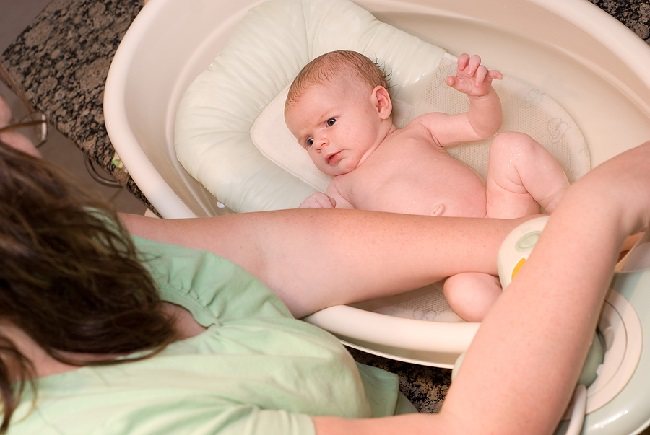
Tips for parents
How to avoid baby crying after bathing? To ensure that water procedures bring pleasure to both the child and parents, the following recommendations should be followed:
- To avoid sudden changes in temperature, gradually add cool water to the bath during the bathing process, so the baby will not feel discomfort.
- The most sensitive area of an adult's skin is the skin of the elbow joint - by lowering this part of the body into the bath, you can understand whether the water is too hot for the child.
- To more accurately determine the water temperature, especially during the first swims, it is better to use a thermometer.
- It is better to bathe a baby an hour after feeding and an hour and a half before bedtime.
- During bathing, avoid excitement and sudden movements so as not to scare the child.
- If the reason why your one-month-old baby cries after bathing is colic, massage the abdomen before taking a bath.
- The duration and time of bathing should be adjusted depending on the baby’s wishes.
If parents have a question about why the child cries a lot after bathing, it is necessary to review all stages of water procedures so that this process brings only positive emotions to the baby.
Uncomfortable water or air temperature
Too hot or, on the contrary, too cold water gives the child discomfort. If the room is cool, he may feel cold when he is undressed for a swim or taken wet from the water and carried to the changing table without being wrapped in a towel.
Before bathing, make sure that the air and water temperatures are comfortable for your baby. The air temperature should not be lower than 23-24°C, and the water temperature 33-34°C (can gradually be lowered to 26°C). Before you put your baby in the water, dip a thermometer or your elbow into the water.
Temperature compliance
Why does my child cry every time after bathing? Often the reason for such a baby’s reaction is failure to maintain the optimal temperature of water and air, both in the bathroom and in the rest of the room.
Correct temperature:
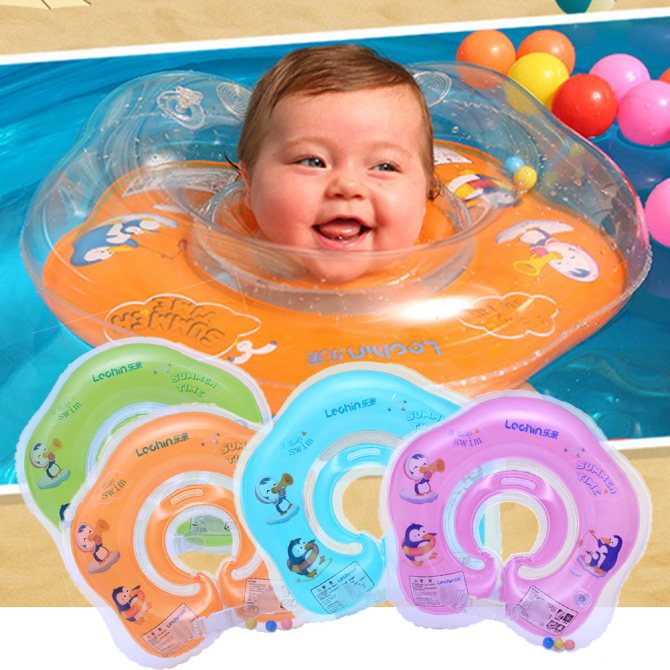
- The optimal water temperature for bathing a child is 36-37 °C.
- The air in the room where the baby grows should not exceed + 22-25 °C.
- To prevent the baby from suffering from temperature changes, it is recommended not to close the door to the bathroom where the procedure is taking place.
Uncomfortable water temperature in most cases is the reason why children cry after swimming.
Why does the child not want to wash?
Determining the causes of a negative reaction to water procedures is the main task for subsequent actions. It’s easier to do this with a preschooler, since he can explain what exactly he doesn’t like, and based on this information, you can change or adjust something during the bathing process.
It is more difficult to find out why a child does not want to wash if he is still a baby and is not able to express his emotions and needs. In such cases, you will have to act experimentally, monitor the baby’s reaction and recognize what you don’t like.
The most common causes of bathroom dissatisfaction include:
- The child is afraid that water, soap, shampoo will get into the eyes and nose.
- Uncomfortable water temperature or the room itself, for example, cold or stuffy.
- Unpleasant smell of detergents, foam.
- I don’t like the process or conditions of washing, for example, my mother uses a washcloth intensively, makes me play, splash, talk loudly, makes me admire the procedure, and so on.
- Fear of hitting, falling, slipping, drowning, which is typical for children who have already experienced similar unpleasant situations.
Each child has his own reasons why he does not like to swim, and as soon as they are clarified, you can begin to gradually accustom your child to swimming, discovering for him the positive aspects of water procedures.
Preparation for water procedures
To avoid the child's dissatisfaction, you can prepare him for this procedure.
Manipulations before water procedures:
- give the child a general massage using baby cream or oil, and an abdominal massage in case of intestinal colic;
- conduct gymnastics appropriate to the baby’s age;
- go to swimming.
If the child’s first bath took place on days when the umbilical wound has not yet healed, the bathing water must first be boiled.
Bathing options
Each parent decides how to bathe their child individually, and it is impossible to say which option is better.
Let's consider several ways:
- In a small bath. The optimal solution for first baths when there is a need to boil water. This option is also relevant if there are interruptions in the water supply in an apartment or house.
- In a large bathroom. The advantages of such bathing are that the baby has room for movement: he can actively move his arms and legs, and roll over.
- Bathing with mom. This option can be used only after the complete cessation of postpartum discharge.
During the water procedures, parents will definitely understand whether the child is comfortable and will be able to answer the question why the child cries after bathing in the bath.
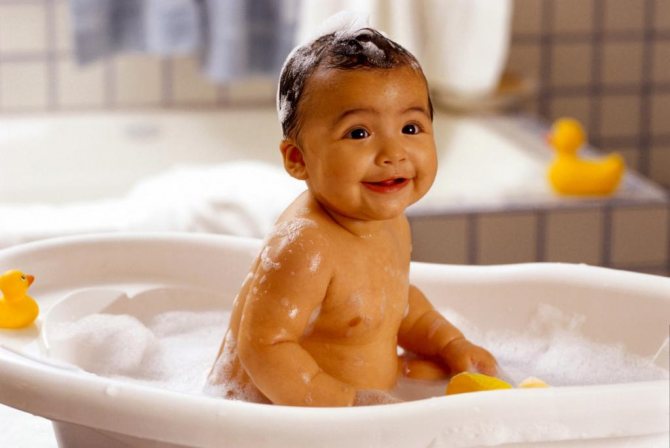
The main reasons for crying when bathing
The reasons why a child cries while bathing are completely varied. There are a number of main factors that influence a child’s behavior when taking water procedures.
Wrong temperature for swimming
Often a child experiences some discomfort when immersed in a bath precisely because of the temperature of the water: too hot or too cold. In addition, the air temperature in the room where he is bathed can also affect the condition of the baby. If it is too low, the child may freeze before or after bathing.
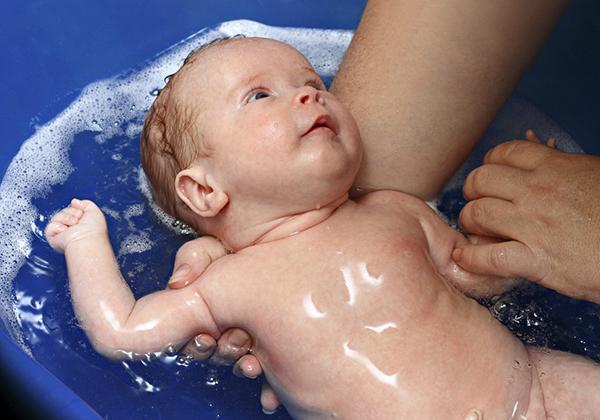
Before starting water procedures, parents should be sure that the air temperature is not lower than 24–25°C, and the water temperature ranges from 34–36°C. Gradually, to harden the child, the water can be heated to 27–28°C. Check the water temperature with a thermometer or with a body part such as the elbow.
Large bathtub
In the first months of life, the baby should bathe in a small bath. This is how he gets used to water procedures. If you decide to let your baby swim in a large bathtub, then make sure that he is ready for this. Of course, in the womb the baby was constantly in liquid and got used to such an environment, but it should be remembered that he had not yet had time to get acquainted with large bodies of water. Sometimes a newborn baby, on the recommendation of doctors, is wrapped in a diaper before immersion. This process can recreate familiar conditions for the baby.
Baby is afraid to swim
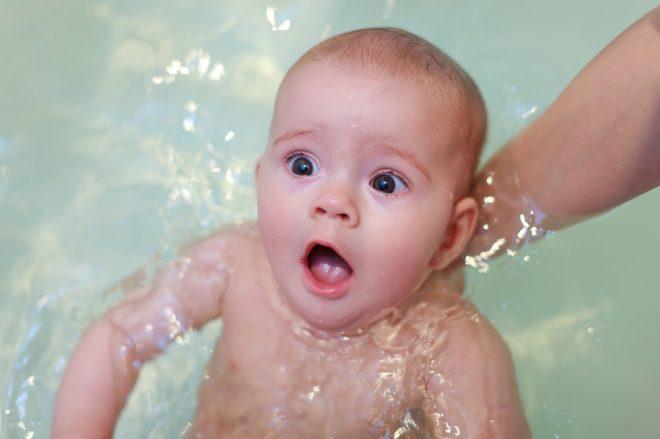
Fear during bathing can occur due to soap getting into the eyes, or due to accidental water getting into the mouth or ears. A child, even the smallest one, is able to remember such situations and subsequently experience fear of water.
The child is uncomfortable in the bath
Often fearing that the child will slip out of their hands, parents hold the child too tightly. This can create some discomfort, which will lead to the newborn crying and being very capricious during bathing. In this case, you need to try to hold the baby in a different way, or give him the opportunity to swim on his tummy.
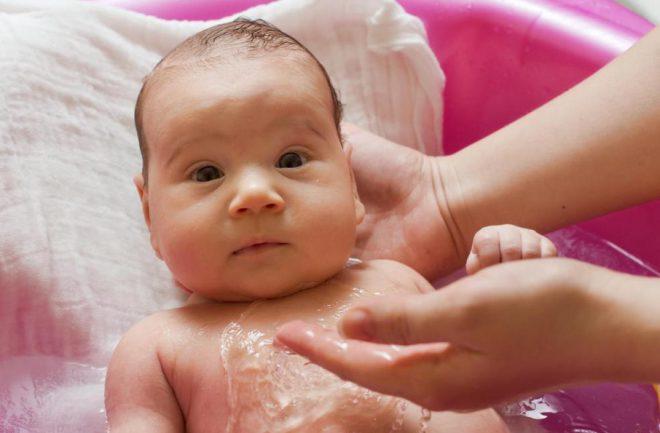
Hunger
A child’s behavior in water can also be influenced, for example, by a feeling of hunger. If a child wants to eat or drink, then he tends to inform his parents about this. Or maybe for now he can only do this by crying. You should try offering your baby either some drinking water or expressed breast milk in the bath.
Neurological disorders
Neurological disorders are also one of the reasons why the baby began to cry in the bath. In this case, the newborn experiences discomfort not only when in contact with water. Moody behavior usually occurs during sleep or eating. Therefore, if a child cries while bathing and there are no apparent reasons for this, then you should contact a specialist who will conduct a special examination of the baby.
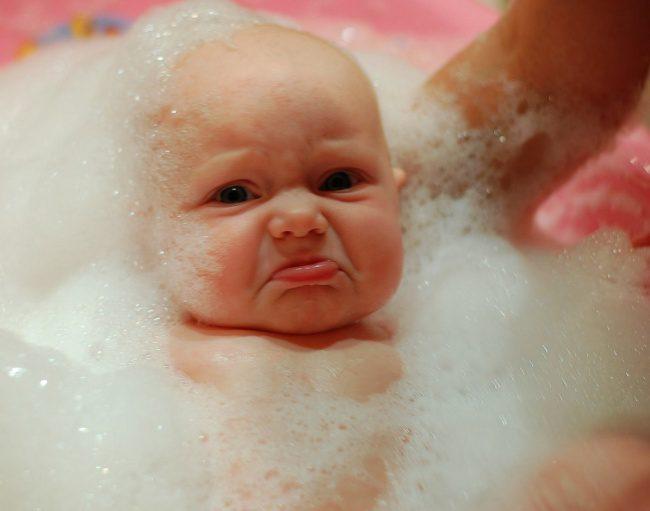
Folk remedies for washing infants
Previously, it was believed that water for bathing newborns must be boiled. Now the opinion of pediatricians has changed - such advice is valid only in the first days of a baby’s life. After the umbilical wound has healed, it is enough to add herbal infusions to the bath to give the water healing power.
What can you add to your baby's bath:
- decoction of string and chamomile (4 tablespoons of dry herbs per 1 liter of boiling water);
- solution of potassium permanganate (5-6 crystals are completely dissolved in a glass of boiling water, after which the resulting solution is cooled and added to the bath).
Such supplements make sense if the child’s skin is prone to heat rash, diathesis, and the navel has not yet healed. In other cases, it is enough to bathe the baby in clean water several times a week, using a special detergent.
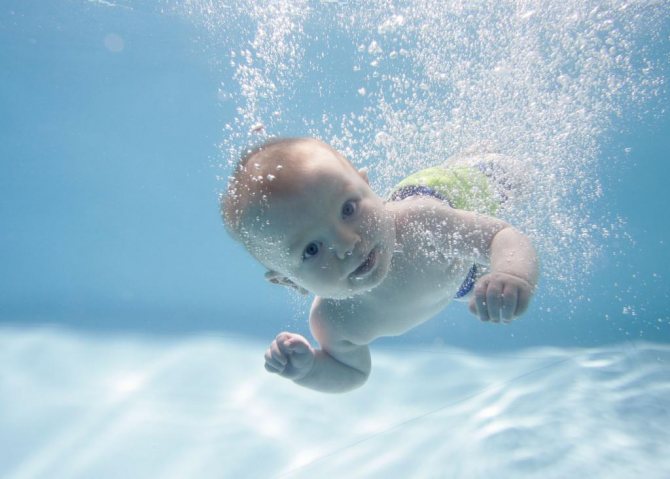
What to do if your baby has always loved to swim, but now he absolutely doesn’t want to?
Such cases are also not uncommon. Remember that an evening bath for babies is a soothing ritual. Therefore, avoid haste, sudden movements, raised voices and nervous tension. Prepare in advance everything you might need - towels, soap and other accessories should be within walking distance so you don’t have to nervously look for them at the most inopportune moment.
While the baby is bathing, you need to talk to him in a calm, friendly and affectionate voice. You can turn on background music, or the mother herself can sing a song to the child, tell a fairy tale or poem. Be sure to remember the importance of a friendly and calm atmosphere during bathing - this is a very important point, as your confidence and positive attitude will certainly be transferred to the child.
How to instill a love of bathing in a baby?
The most important thing is to be patient. You will have to try very hard to get your baby to enjoy water treatments again.
- Eliminate all negative factors, create optimal conditions for swimming according to the above list.
- To make your newborn feel more confident, buy a non-slip bath mat or stand. To prevent water from getting on the face, use special caps with a visor and keep a small towel on hand, which can be used to quickly wipe drops from the child’s face.
- Sometimes it makes sense to buy a smaller bathtub - some children are intimidated by a large space. Or in this case, you can bathe the baby in a large basin.
- You can temporarily cancel bathing and replace it with a shower. The child will quickly forget about his negative experience, and then it will be possible to return him to the baby bath.
- Another idea is to bathe with mom or dad. For a child, such bathing is a real pleasure, since a parent nearby gives a feeling of security, and it is much more interesting for the two of them to play in the water.
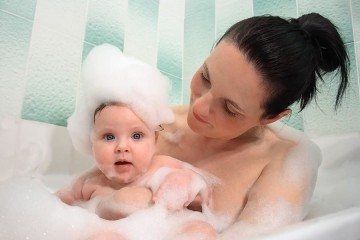
Your main task is to show your baby that bathing is very fun and enjoyable. Sing, recite poems, communicate with your child and smile at him.
If the child is older
If you are bathing an older baby, then you can do many interesting experiments with him in the bath, especially since nothing complicated is required - for a child, even an ordinary soap bubble looks like a real miracle. For a child who doesn’t like to wash his hair, you can make soap “horns” or a crown on the top of his head, and then show him in the mirror how funny it looks. There are also many bath toys - waterproof books, special water-based paints, robotic toys that can swim and dance in the water.
Remember that bathing is not only a hygienic procedure, but a whole developmental activity. For a very small child, even just the feeling of water flowing over the tummy will be a new experience that helps them understand the world and their own body. And when the baby grows up, you can invent a huge number of “bath” games with him that will appeal not only to the little bather, but also to the parents themselves. Moreover, you can visit the pool by signing up for the infant swimming section. Such activities can give a strong impetus to the development of newborns.
Now you know why your baby cries while bathing. By following the suggested recommendations, you will be able to eliminate the cause of your baby’s crying during bathing.
A child cries while bathing - video
Why does a child cry while bathing?
1 (20%) voted 1
Required Items
In order for the infant to bathe successfully, before starting water procedures, the mother must make sure that everything necessary is available.
List of things for swimming, during and after:
- thermometer for measuring water temperature;
- gel, foam or shampoo that does not cause tears;
- a large towel made of natural material, preferably with a corner;
- herbal decoction or solution of potassium permanganate.
As additional devices, you can use a slide, an inflatable ring, bathing toys, and a chair for mom if it’s hard for her to bend over.
Possible difficulties
Sometimes when asked why a child cries every time after bathing, the answer suggests itself.
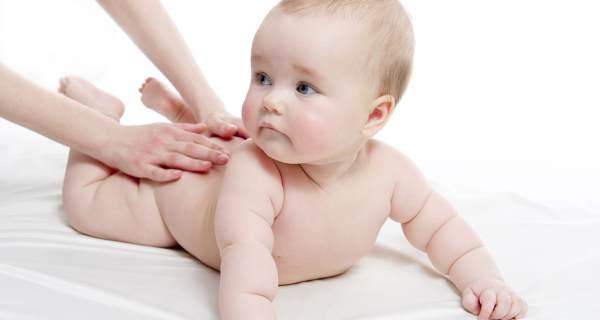
Obvious problems when bathing a baby:
- The baby choked on the water. In this situation, it is important not to panic - the newborn still has innate reflexes, thanks to which he will not choke, but will only clear his airways.
- Parents hold their child uncomfortably. If the baby floats on his back, it is enough to support his head. When first trying to swim on your stomach, support your baby under your chin and chest.
It can take a long time to figure out why children cry after bathing. But if you perceive this process as mutual pleasure, such a problem will not arise.
Neurological problems or gastrointestinal immaturity
Sometimes the answer to the question of why a newborn cries when bathing should be sought together with specialists. If the child’s behavior is restless not only during bathing, but also during eating or sleeping at night, show the baby to a neurologist and gastroenterologist. If the baby has a curvature of the cervical spine, increased tone of the arms and legs, or suffers from colic, he relaxes in the water, but when you try to remove him from the water, the unpleasant sensations in the muscles or stomach return, and the baby cries.
How to organize a bath without tears?



